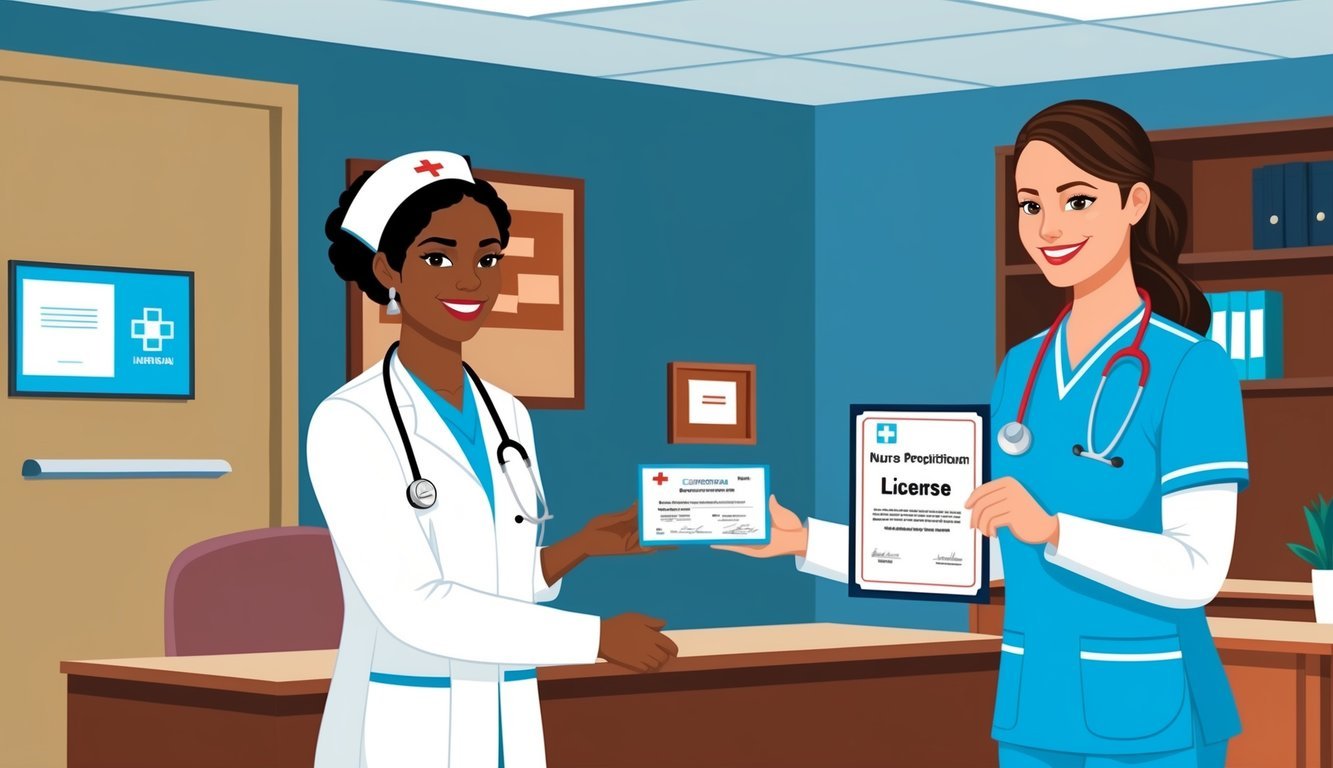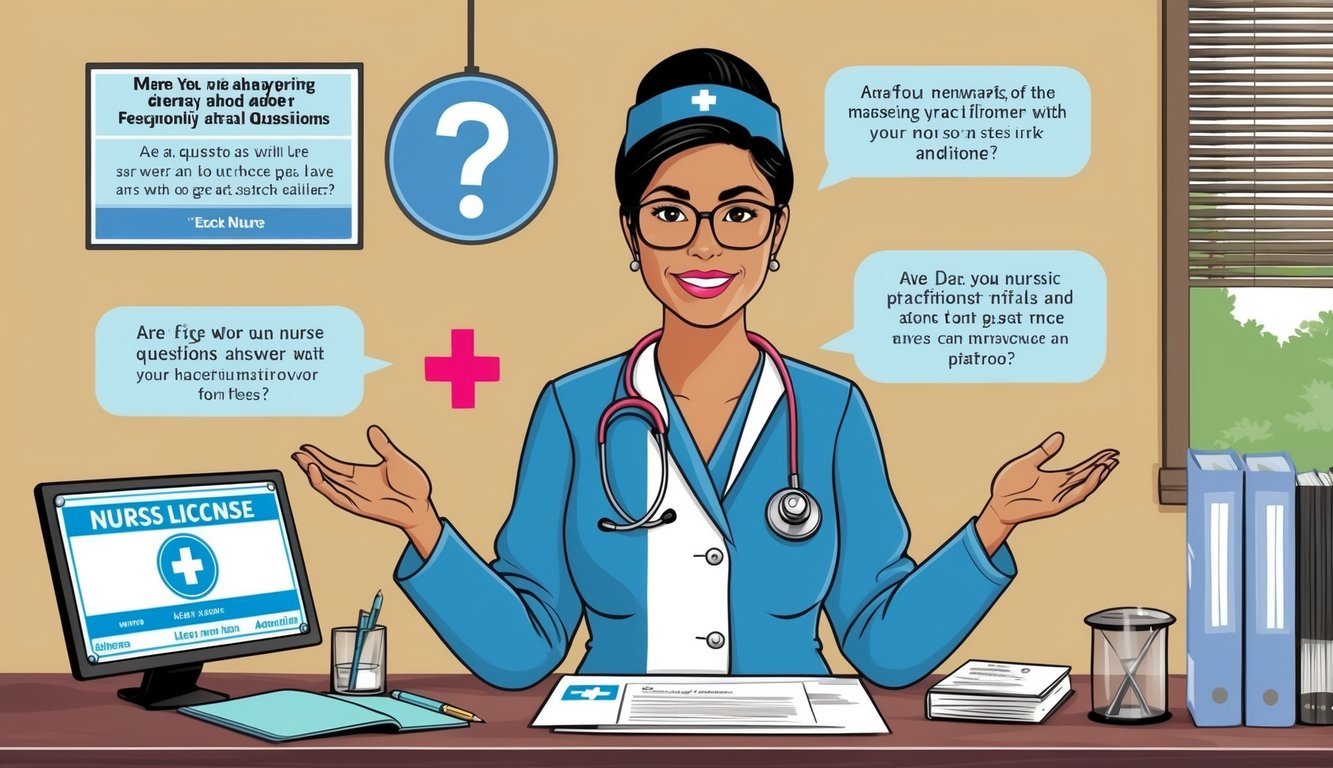Nurse practitioners (NPs) play a vital role in today’s healthcare system. To become a licensed nurse practitioner, you need advanced education and training to provide comprehensive care for patients. With the ability to diagnose and treat illnesses, as well as prescribe medications, NPs are essential for meeting the increasing demand for healthcare services.
The path to licensure involves completing a master’s or doctoral degree in nursing, followed by passing national certification examinations.
You have the chance to specialize in areas such as family health, pediatrics, or mental health, allowing you to focus on what you are most passionate about in nursing.
By choosing this career, you open doors to various professional opportunities and pathways for advancement.
As you explore your options, understanding the certification and recertification processes will be crucial.
These ensure that you are always providing high-quality care to your patients, while also staying up-to-date with industry standards and practices.
Key Takeaways
- NPs provide crucial primary and specialized care in healthcare settings.
- Licensure requires advanced degrees and successful completion of certification exams.
- Continued education and certification maintain high standards in patient care.
Pathways to Becoming a Nurse Practitioner
Becoming a nurse practitioner (NP) involves several important steps.
You will need the right educational background, the necessary licensure and certifications, and specialized training to succeed in this role.
Educational Background
To start your journey towards becoming an NP, you must first obtain a Bachelor of Science in Nursing (BSN).
This degree provides you with fundamental nursing knowledge and skills.
After earning your BSN, you can either pursue a Master of Science in Nursing (MSN) or a Doctor of Nursing Practice (DNP).
The MSN program typically involves advanced clinical training and specialized coursework in areas such as pharmacology and diagnostics.
Many NP programs require specific prerequisites, including courses in health sciences.
It’s essential to ensure your educational institution is accredited.
Completing your BSN and advancing to a graduate program is crucial for your future certification.
Licensure and Certifications
After completing your graduate education, you must pass the national NP certification exam relevant to your specialty.
Common certifications include Family Nurse Practitioner (FNP) and Adult-Gerontology Nurse Practitioner (AGNP).
In addition to certification, you will need to obtain licensure as a registered nurse (RN) in your state.
This process usually requires passing the National Council Licensure Examination for Registered Nurses (NCLEX-RN).
Each state has specific requirements, so it is important to research your state’s regulations to stay compliant.
Specialized Training and Experience
Specialized training is vital for your success as an NP.
Many programs include clinical rotations where you gain hands-on experience in various healthcare settings.
You should also consider obtaining additional certifications, such as those in pediatrics or gerontology, which may enhance your employability.
Engaging in continuous education through workshops or conferences can keep your skills current.
Your experience as a registered nurse will significantly benefit you in your NP role, providing insights into patient care that are invaluable in practice.
Clinical Practice and Patient Care

In clinical practice, nurse practitioners (NPs) play a vital role in delivering patient care.
You will engage in essential activities such as diagnosing conditions, prescribing medications, and managing patient relationships.
Each aspect contributes significantly to the quality of care patients receive.
Roles and Responsibilities
As a nurse practitioner, your responsibilities include providing primary care services, conducting health assessments, and implementing treatment plans.
You will perform physical exams, gather medical history, and order diagnostic tests like lab work or imaging studies.
In addition, NPs are authorized to prescribe medications, which is crucial for effective disease management.
Your role may also involve educating patients about their conditions and preventive care strategies.
This holistic approach aims to empower patients in their health journeys.
Diagnostic and Treatment Proficiency
You must be proficient in interpreting diagnostic tests to make informed treatment decisions.
This includes understanding lab results, X-rays, and other imaging formats.
Your ability to diagnose conditions accurately will guide you in developing appropriate treatment plans.
Furthermore, you will use evidence-based practices in patient care.
This means staying updated on clinical guidelines and best practices to ensure high-quality care.
Effective management of chronic diseases, such as diabetes or hypertension, relies on your skills in both diagnosis and ongoing patient assessment.
Patient Relationship Management
Building strong relationships with patients is essential for effective care.
You should strive to create a welcoming environment where patients feel comfortable discussing their health concerns.
Active listening and empathy are critical components.
Regular follow-ups and patient education will enhance these relationships.
You can engage your patients by discussing lifestyle modifications and preventive care measures.
This approach not only fosters trust but also improves patient compliance and outcomes in their health management.
Utilizing tools like the AANP can support you in your clinical practice by providing resources and guidelines on best practices and patient care strategies.
Advanced Specialties within Nursing
Advanced practice nursing includes various specialties that help meet diverse patient needs.
Each specialty focuses on specific populations and health conditions, allowing you to provide targeted care.
Family Nurse Practitioner
As a Family Nurse Practitioner (FNP), you focus on providing comprehensive care to individuals and families.
This includes health promotion, disease prevention, and management of chronic conditions across all age groups.
FNPs often conduct physical exams, diagnose illnesses, and develop treatment plans.
They are also trained to address mental health issues.
You might work in clinics, private practices, or community health centers.
To become an FNP, you typically need a master’s degree in nursing and specific certification.
Resources like the American Association of Nurse Practitioners provide valuable information for aspiring FNPs.
Adult-Gerontology Nurse Practitioner
The Adult-Gerontology Nurse Practitioner (AGNP) specialization focuses on adult patients, including the elderly population.
You will assess and manage chronic and acute healthcare needs, collaborating with other healthcare professionals.
AGNPs are skilled in treating conditions such as diabetes, heart disease, and arthritis.
Advanced assessments and diagnostic skills are key components of your role.
You’ll often work in hospitals, outpatient facilities, and nursing homes.
Obtaining certification is crucial, and you can find resources through the National Organization of Nurse Practitioner Faculties.
Pediatric and Neonatal Care
Pediatric and Neonatal Nurse Practitioners specialize in caring for infants, children, and adolescents.
Your expertise includes monitoring growth and developmental milestones while addressing common childhood illnesses.
Neonatal Nurse Practitioners focus specifically on critically ill newborns, often in intensive care settings.
You are responsible for advanced procedures and assessments, making this a high-stakes role.
Certification through organizations such as the Pediatric Nursing Certification Board is essential for advancing your career in this field.
Women’s Health and Oncology
Women’s Health Nurse Practitioners (WHNP) specialize in reproductive health, including prenatal care and gynecological examinations.
You will provide counseling on issues like contraception and menopause management.
Oncology Nurse Practitioners focus on caring for patients with cancer, supporting them through treatment and recovery.
You help with symptom management and provide education on disease processes.
Both roles require specialized training and certification, which you can pursue through professional organizations.
The Oncology Nursing Society offers resources to support your journey.
Certification and Recertification
Certification is essential for nurse practitioners to validate their skills and knowledge.
It involves meeting specific requirements set by national certification boards and maintaining that certification through continuing education.
National Certification Boards
In the United States, there are two primary boards for nurse practitioner certification: the American Academy of Nurse Practitioners Certification Board (AANPCB) and the American Nurses Credentialing Center (ANCC).
| Certification Board | Focus Areas | Renewal Period |
|---|---|---|
| AANPCB | Family, Adult-Gerontology, and more | Every 5 years |
| ANCC | Various specialties | Every 5 years |
Both boards require that you pass a certification exam to demonstrate your competence.
For more details, refer to the AANPCB and ANCC websites.
Certification Maintenance and Continuing Education
Maintaining your certification involves completing continuing education (CE) credits.
You must demonstrate ongoing competence through various professional development activities.
- Continuing Education Requirements:
- Total CE Credits: Varies by board.
- Renewal Fee: Costs may differ; for ANCC, fees range from $295 to $395 based on membership.
Both AANPCB and ANCC offer resources and guidelines in their candidate handbooks to help you throughout this process.
Accessing reliable learning opportunities ensures that you keep your skills up-to-date and maintain certification.
Professional Advancement and Opportunities

As a licensed nurse practitioner (NP), you have access to various pathways for career growth and development.
These opportunities not only enhance your professional skills but also contribute to the healthcare system.
Understanding your options in career advancement and the evolving role of NPs can significantly impact your career satisfaction and effectiveness in patient care.
Career Development and Advancement
Career development for nurse practitioners encompasses multiple aspects, including continuing education, certifications, and specialization.
Organizations like the AANP provide numerous continuing education opportunities to help you stay current with industry standards and practices.
Many NPs pursue further specialization, which can lead to higher demand in specific areas of healthcare.
Consider the following paths for advancement:
- Certifications: Obtaining certifications in areas like pediatrics, geriatrics, or psychiatric mental health can boost your employability.
- Networking: Joining professional organizations can connect you with mentors and other professionals, opening doors for job opportunities.
- Leadership Roles: Seeking leadership roles within your organization can enhance job security and job satisfaction.
The Role of Nurse Practitioners in Evolving Healthcare
The role of nurse practitioners is pivotal in the changing landscape of healthcare services.
With the push for full practice authority in many states, NPs enjoy greater autonomy in providing care.
This shift not only enhances your ability to manage patient care but also helps address the growing shortage of healthcare providers.
According to the Bureau of Labor Statistics, the demand for NPs is expected to grow substantially, leading to strong job security.
As healthcare continues to evolve, your role may expand to include more responsibilities, such as:
- Patient Education: Educating patients about health management and disease prevention.
- Chronic Disease Management: Providing comprehensive care for patients with chronic illnesses.
- Collaborative Care: Working alongside physicians and other healthcare providers to improve patient outcomes.
Staying informed and proactive about these advancements can greatly benefit your career trajectory and the quality of care you provide.
Frequently Asked Questions

This section covers important information about becoming a licensed nurse practitioner, verification of licenses, and the differences between nursing roles.
You will also learn about the certification process and salary expectations for nurse practitioners.
What are the requirements to become a licensed nurse practitioner?
To become a licensed nurse practitioner, you typically need a master’s degree in nursing or a Doctor of Nursing Practice (DNP).
You must also hold a registered nurse (RN) license and pass a national certification exam in your specialty area.
Many states require continuing education to maintain your license.
How does one verify a nurse practitioner’s license in California?
You can verify a nurse practitioner’s license in California by visiting the California Board of Registered Nursing website.
There, you can search for a specific NP by name or license number.
This allows you to check their status and any disciplinary actions.
What are the differences between a Registered Nurse (RN) and a Nurse Practitioner (NP)?
The main difference is in the level of education and scope of practice.
RNs typically have an associate or bachelor’s degree and focus on patient care.
NPs, on the other hand, have advanced degrees and can diagnose, treat, and prescribe medications.
| Role | Education Level | Scope of Practice |
|---|---|---|
| Registered Nurse (RN) | Associate/Bachelor’s | General patient care |
| Nurse Practitioner (NP) | Master’s/DNP | Diagnosis, treatment, and prescribing |
What is the process for obtaining nurse practitioner certification?
To obtain certification, you must complete an accredited NP program and pass a national certification exam.
After passing, you can apply for state licensure.
Each state may have additional requirements, so check with your state’s board for specific details.
In what ways do the roles of Licensed Practical Nurses (LPN) and Nurse Practitioners (NP) differ?
LPNs usually require a shorter, less intensive education, often a diploma or certificate program.
They focus on basic patient care under the supervision of RNs or physicians.
NPs perform advanced clinical practices, including assessment, diagnosis, and treatment planning.
What are the salary expectations for a licensed nurse practitioner?
Salary can vary widely depending on factors such as location, specialty, and experience.
The U.S. Bureau of Labor Statistics reports that nurse practitioners generally earn a higher median annual wage than registered nurses.
This reflects their advanced skills and training.

